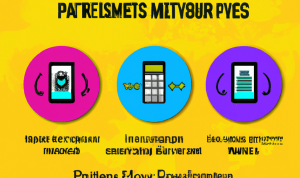Cross Border Online Payments Challenges and Solutions explores the complexities of financial transactions that transcend national boundaries. In today’s globalized economy, businesses frequently engage in cross-border commerce, necessitating efficient online payment systems. However, navigating different currencies, regulations, and consumer preferences can pose significant hurdles. Understanding these challenges and identifying viable solutions is essential for organizations looking to thrive in an interconnected market.
In today’s fast-paced world, where technology is advancing at an unprecedented rate, the importance of digital literacy cannot be overstated. Digital literacy encompasses the skills and knowledge needed to navigate the digital landscape effectively. From basic computer skills to understanding online privacy and security, being digitally literate is essential for individuals to thrive in both personal and professional settings.First and foremost, digital literacy begins with the fundamental understanding of computer hardware and software.
Knowing how to operate a computer, navigate operating systems, and utilize common software applications such as word processors, spreadsheets, and presentation software forms the foundation of digital skills. These skills are not only crucial for everyday tasks but also for accessing and sharing information effectively.As we delve deeper into digital literacy, the importance of internet navigation comes into play. In an age where information is abundant yet often overwhelming, the ability to efficiently search for and evaluate online resources is vital.
This includes understanding how search engines work, using s effectively, and discerning credible sources from unreliable ones. Developing these skills empowers individuals to access quality information, enhancing their knowledge and decision-making capabilities.Furthermore, digital literacy extends beyond mere navigation; it also involves understanding digital communication tools. Familiarity with email, instant messaging, video conferencing, and social media platforms is essential in both personal and professional contexts.
Being able to communicate effectively online contributes to building relationships, collaborating on projects, and even networking for career opportunities. However, digital communication also comes with its own set of challenges, such as interpreting tone and managing online etiquette, which individuals must navigate with care.Another significant aspect of digital literacy is online privacy and security. In a world where data breaches and cyber threats are increasingly common, knowledge about safe online practices is imperative.

This includes understanding the importance of strong passwords, recognizing phishing attempts, and knowing how to protect personal information. By fostering a culture of digital safety awareness, individuals can safeguard their digital identities and protect themselves from potential harm.Moreover, digital literacy is not a static skill set but an ever-evolving one. As technology continues to change, so too must our understanding of it.
This requires a mindset of continuous learning and adaptability. Engaging with new technologies, whether it be through online courses, workshops, or self-directed learning, ensures that individuals remain relevant in an increasingly digital world.In the realm of education, digital literacy has become a critical component of the curriculum. Schools and universities are increasingly recognizing the need to equip students with the digital skills necessary for success in their future careers.
This includes integrating technology into the classroom, teaching coding and programming, and encouraging collaboration through digital platforms. By fostering digital literacy from a young age, educational institutions are preparing the next generation for the demands of a technology-driven workforce.On the professional front, digital literacy is often a prerequisite for employment. Many employers seek candidates who possess not only technical skills but also the ability to adapt to new technologies and work collaboratively in digital environments.
Job seekers who can demonstrate their digital literacy are more likely to stand out in a competitive job market, making these skills invaluable for career advancement.As we consider the implications of digital literacy, it is essential to recognize the digital divide that exists in our society. Not everyone has equal access to technology and the internet, which can exacerbate existing inequalities.
Bridging this gap is crucial to ensuring that all individuals have the opportunity to develop their digital skills. Community programs, public libraries, and non-profit organizations play a vital role in providing resources and training to those who may be underserved in terms of technology access.In conclusion, digital literacy is a multifaceted skill set that encompasses a range of competencies necessary for navigating the digital world.
From understanding computer systems and effective internet navigation to mastering online communication and prioritizing digital safety, these skills are essential for personal and professional success. As technology continues to evolve, so too must our commitment to fostering digital literacy for individuals of all ages. By doing so, we can empower ourselves and others to thrive in the digital age, ensuring that everyone has the tools needed to succeed in an increasingly interconnected world.





